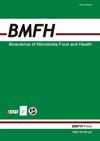Safety evaluation of a heat-treated <i>Bifidobacterium bifidum </i>OLB6378 concentrate
IF 2.9
4区 医学
Q2 Agricultural and Biological Sciences
引用次数: 0
Abstract
Several bacterial strains, including probiotic strains, have undergone evaluations for their safety and potential beneficial health effects. Some of these strains have been introduced into various markets, including that for infant products. However, certain probiotic strains have been linked to serious infections in infants, such as septicemia and meningitis. Given this, it is crucial to assess the safety of each probiotic strain, including those of Bifidobacterium, which is a common genus of probiotics. One such strain, Bifidobacterium bifidum OLB6378 (NITE BP-31), referred to as OLB6378 hereafter, has been selected for use in infants. To determine its genotoxicity and general toxicity potential, a heat-treated OLB6378 concentrate was subjected to various tests, including the bacterial reverse mutation test, in vitro chromosome aberration test, in vivo micronucleus test, and single- and 90-day oral gavage toxicity studies in rats. No significant differences were observed compared with negative controls in any of genotoxicity tests. The single-dose toxicity study employed dose levels of 560, 1,693, and 5,092 mg/kg, representing the total solid contents of culture concentrates containing OLB6378 (equivalent to 8.1 × 1011, 2.4 × 1012, and 7.4 × 1012 cells/kg of Bifidobacterium, respectively). In the 90-day toxicity study, dose levels of 280, 853, and 2,546 mg/kg/day were used (equivalent to 4.0 × 1011, 1.2 × 1012, and 3.7 × 1012 cells/kg/day, respectively). Importantly, the heat-treated OLB6378 concentrate did not induce any signs of toxicity in any of the conducted toxicity studies. In conclusion, the heat-treated OLB6378 concentrate exhibited no genotoxicity potential, and the no-observed-adverse-effect level in the 90-day toxicity study was determined to be 2,546 mg/kg/day (equivalent to 3.7 × 1012 cells/kg/day). This suggests that heat-treated OLB6378 can be safely utilized as a food source.热处理两歧双歧杆菌OLB6378浓缩物的安全性评价
一些细菌菌株,包括益生菌菌株,已经对其安全性和潜在的有益健康影响进行了评估。其中一些菌株已被引入各种市场,包括婴儿产品市场。然而,某些益生菌菌株与婴儿的严重感染有关,如败血症和脑膜炎。鉴于此,评估每种益生菌菌株的安全性至关重要,包括双歧杆菌,这是一种常见的益生菌属。其中一种这样的菌株,两歧双歧杆菌OLB6378 (NITE BP-31),以下简称OLB6378,已被选择用于婴儿。为了确定其遗传毒性和一般毒性潜力,对热处理的OLB6378浓缩物进行了各种试验,包括细菌反向突变试验、体外染色体畸变试验、体内微核试验以及大鼠单天和90天灌胃毒性研究。与阴性对照相比,在任何遗传毒性试验中均未观察到显著差异。单剂量毒性研究采用560、1693和5092 mg/kg的剂量水平,代表含有OLB6378的培养浓缩液的总固体含量(分别相当于双歧杆菌8.1 × 1011、2.4 × 1012和7.4 × 1012个细胞/kg)。在90天的毒性研究中,剂量水平分别为280、853和2546 mg/kg/天(分别相当于4.0 × 1011、1.2 × 1012和3.7 × 1012细胞/kg/天)。重要的是,经过热处理的OLB6378浓缩物在任何进行的毒性研究中都没有引起任何毒性迹象。综上所述,经热处理的OLB6378浓缩物没有遗传毒性潜力,在90天的毒性研究中,未观察到的不良反应水平为2,546 mg/kg/day(相当于3.7 × 1012个细胞/kg/day)。这表明经过热处理的OLB6378可以安全地用作食物源。
本文章由计算机程序翻译,如有差异,请以英文原文为准。
求助全文
约1分钟内获得全文
求助全文
来源期刊

Bioscience of Microbiota, Food and Health
Immunology and Microbiology-Applied Microbiology and Biotechnology
CiteScore
5.50
自引率
3.20%
发文量
24
期刊介绍:
Bioscience of Microbiota, Food and Health (BMFH) is a peer-reviewed scientific journal with a specific area of focus: intestinal microbiota of human and animals, lactic acid bacteria (LAB) and food immunology and food function. BMFH contains Full papers, Notes, Reviews and Letters to the editor in all areas dealing with intestinal microbiota, LAB and food immunology and food function. BMFH takes a multidisciplinary approach and focuses on a broad spectrum of issues.
 求助内容:
求助内容: 应助结果提醒方式:
应助结果提醒方式:


